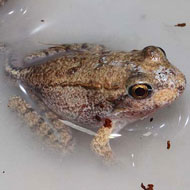
Conservationists hail the successful breeding of critically endangered species
One of the world's rarest frogs may have been saved from the brink of extinction, thanks to a successful breeding programme at ZSL London Zoo.
Fifty-one mountain chicken frogs - one of the planet's most critically endangered animals - have been returned to their Caribbean home.
Native only to the islands of Monserrat and Dominica, the species has been decimated by chytrid fungus. Conservationists launched an international project to save the species, fearing wild populations had been all but wiped out.
Ben Tapley, ZSL's head of herpetology, said: "Mountain chicken frogs are one of the most endangered animals on this planet - not only are they facing threats from habitat loss, but their numbers plummeted due to the introduction of the most devastating disease known to affect amphibians worldwide."
The released frogs have been fitted with tracking devices so that conservationists from ZSL and the Durrell Wildlife Conservation Trust can monitor them and learn more about their behaviour in the wild and disease dynamics.
Jeff Dawson, Durrell's amphibian programme officer, said: "The current release in Montserrat is the culmination of our four year long mountain chicken project on the island, and the team from Durrell and the Department of Environment has been working tirelessly over the last nine weeks radio tracking the released frogs.
"The data collected will help our understanding around the dynamics of this disease in the wild which will be vital in guiding our future conservation actions for this amazing species."
Back in 2009, experts from ZSL and Durrell reported that the population of mountain chicken frogs, which are the largest frog species, had declined drastically as a result of disease. Conservationists acted quickly, airlifting 50 of the frogs from the island.
They were taken to three custom-built centres at London Zoo, Durrel in Jersey and Parken Zoo in Sweden. There they became the founders of a conservation breeding programme to save the species, which would otherwise have been wiped out by disease.
The project was an incredible success, with 76 frogs being produced by just two females at London Zoo in 2012. The frogs were then reared at Durrell and London Zoo before being released in a protected forest on the island of Monserrat.
The mountain chicken frog recovery programme was formed by partnership between Durrell, ZSL, the governments of Monserrat and Dominica, Nordens Ark and the North of England Zoological Society Chester Zoo. The frogs were returned to the island ahead of International Mountain Chicken Frog Day, which takes place on Saturday, September 13.
Image © Ian Stephen, ZSL.



 RCVS Knowledge has welcomed Professor Peter Cockcroft as editor-in-chief for Veterinary Evidence.
RCVS Knowledge has welcomed Professor Peter Cockcroft as editor-in-chief for Veterinary Evidence.